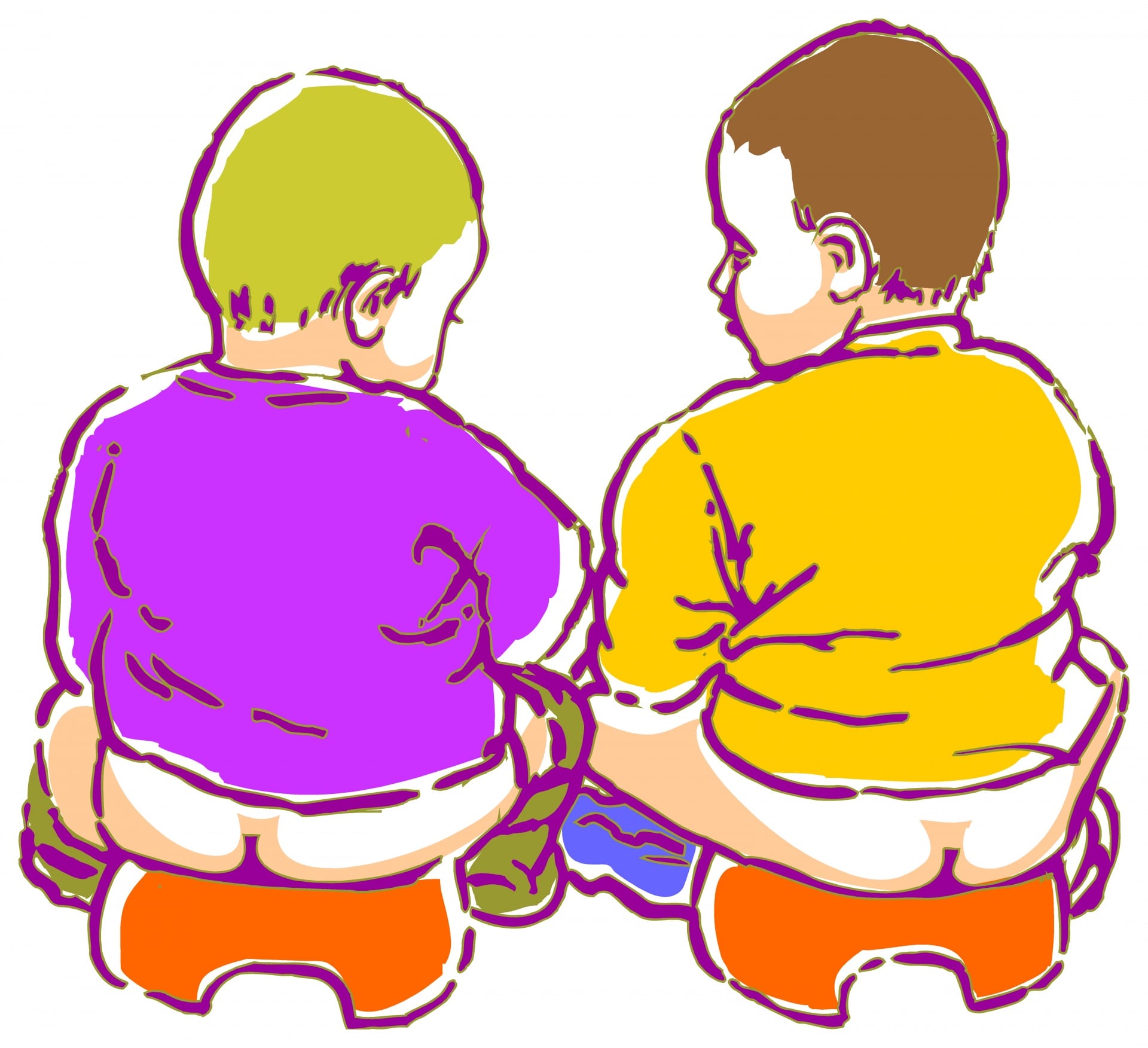Toilet training is different for every kid. Individual parenting styles and varied personalities in children can make for all kinds of bathroom situations.
Easy kids usually show an interest in the potty. With practice and patience, parents can get their kid trained. However, some kids are tougher. There are kids that are afraid of the potty. Some kids are protective of their waste and don’t want to see it go away. Many kids simply don’t want to try anything new.
Developmentally, your kid will usually become ready for toilet training somewhere around age 2, but don’t worry, parents! The average age for girls to potty train is 29 months, and for boys is 31 months. However, 99% of kids are potty trained by 36 months. The process of potty training usually takes 3-6 months, but remember that it is common to wet the bed at night until age 6.
How do I know if my kid is ready for toilet training?
- Able to communicate about the toilet
- Imitates adults/other children
- Able to follow instructions
- Longer periods with a dry diaper
- Bowel movements on a somewhat predictable schedule
- Motor skills (able to pull down pants, get on the toilet)
- Independence (“I want to do it myself”)
- Desire to please (gives gifts, likes praise)
- Shows an interest in the toilet
Research shows that starting too early will significantly prolong the learning curve! Wait until they show that they are ready.
Helpful Toilet Training Tips
Patience
Breathe deep and try not to give them toilet issues. Your kid should feel in control. Pay attention to their signals and help them define their own independence. Don’t pressure or force your child. Don’t rush it and don’t cave to pressure from in-laws or other influences, even if it’s sometimes difficult!
Get it done in a weekend!
If you’re willing to deal with a few accidents, let your kid wear underwear the entire weekend. Try to get them on the potty every 15-20 minutes. Any accidents should be explained – accidents don’t happen when you use the potty. Be honest and open about accidents, but it’s important not to shame your kid.
Go nude!
If your child isn’t wearing anything below the waist, they will have nowhere to put their waste. They may either want to use the potty, or they may ask for a diaper to go in. Praise them for recognizing their body’s signals and ask them to go to the bathroom to poop in their diaper. You can work towards getting them on the toilet.
Be positive.
Toilet flushing is really cool! Look at the way it swirls! Wow, kiddo, I wonder where it all goes! Maybe it goes to the moon! Maybe it feeds all the fish in the sea! Wow!
Avoid using negative words to describe bowel movements, like “stinky,” “icky,” or “dirty”. Remind them that mistakes are common and are not indicative of failure. Mistakes are an important part of learning.
If you have an older child that’s already toilet trained, help them to realize that they are a helpful part of the process. Don’t compare your child to other children, yours or otherwise. Every child develops on their own timeline, as individuals. Encourage a positive, goal-oriented partnership between your child and your family.
Use the right language.
Use words like poop, bowel movement, pee, urine, anus, penis, vagina, vulva, etc. For tougher kids, try grabbing a picture of the digestive system and explain where the food goes in, what happens to it, and where it leaves the body. You can explain how the body gets nutrients from the food we eat and why this is an important process for all of our daily functions. Explain the ring of muscles that control releasing our urine or bowel movements. We can control those muscles if we pay attention to what our bodies are telling us.
Reward System
Use something your kid has an interest in to entice them to use the potty. Maybe they get 3 shiny rocks when they pee, 5 when they wipe themselves and 7 when they poop. Try to use something that you know really interests them, like toys, cool rocks, shells, cars, etc. Avoid using food as a reward or punishment.
Don’t Overdo Praise
It’s important to praise them and use positive language, but don’t overdo it. This may cause your kid to feel shame if they have an accident.
School
Make sure to communicate with other caregivers about your method and process to maintain consistency.
Target Practice
If you have a male child, you can make it a game by placing a few cheerios in the toilet for your child to use as target practice.
Always Bring A Change of Clothes
 Kiddie Potties
Kiddie Potties
Some kids want to use the grown-up potty and some prefer a potty more their own size. You can purchase a training potty that you can place in the living room and incrementally move it towards the bathroom.
If your child wants to use the grown-up potty, you can either leave it as is or purchase an attaching child seat. Make sure your kid’s feet are supported with a stool of some kind. It should feel stable and not intimidating.
You may want to try letting them get comfortable on the toilet with their clothes on before expecting them to use it.
Don’t drink before bed.
Limit liquids to a couple of hours before bedtime to avoid wetting during the night.
Books
Head to your local bookstore or library and pick up a couple of books that support your child’s process.
Don’t start during a high-stress time.
If you’re moving or inviting a new baby into your home, wait until things become settled to start potty training.
Celebrate the victories.
Have an underwear party when your kid graduates to using underwear. Celebrate transitions and successes.
Regression
Regression can be a challenge to deal with, especially if you felt you had already succeeded. It’s important to stay positive and help spread an attitude of encouragement. Parents can decide if they think it’s better to keep trying or to wait a couple of months to continue the training. The most important part is to avoid making your child feel ashamed.
When to Contact a Specialist
If you are concerned about your child’s progress, talk to your healthcare practitioner. They can help you rule out any medical causes, or refer you to a behavioral specialist.
Some kids refuse to use the toilet for pooping. This could be due to constipation, fear of the toilet or bathroom, desire for attention or control, or not wanting to stop playtime to use the toilet. Try to help them through these issues rather than increase the pressure. Children might withhold their poop rather than use a toilet, which is not healthy.
Special needs kids can be particularly challenging to toilet train. However, this can be a really important moment in your child’s growth. Use this challenging time as a way to celebrate their progress and avoid focusing on any mistakes. This is a great learning opportunity for them! Refer to the AAP’s page on Toilet Training Children with Special Needs.
For questions or comments, respond to this post or contact us!





